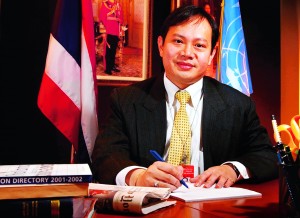On a bench outside a closed room at the United Nations, Suriya Chindawongse ’87 waits to buttonhole a diplomat or two and drum up some news. Like a reporter, he has made acquaintances and cultivated sources. Deadline driven, he’s got an audience to feed.

Suriya Chindawongse ’87 as political officer for Thailand at the United Nations in 2003.
But Chindawongse isn’t any old news hound, though sometimes relegated to sitting like one in the U.N. corridors. As first secretary and political officer of Thailand’s 10-member permanent mission to the U.N., he gets the scoop for just one readership, his government.
“You have to build rapport and make friends, and then, too, you have your sources,” says Chindawongse.
“One indication of a successful operation is if we can get the information back to Bangkok 24 hours before it’s all over The New York Times and Washington Post.“
Information is crucial to Chindawongse’s small and peaceful country, a kingdom that avoids controversy as it relishes a supporting role on the world stage. A smaller fry, it is sometimes shut off from meetings such as the U.N. Security Council, whose decisions impact the entire globe.
Listening was Thai diplomats’ task when the U.N. dealt with the Taliban and al Qaeda in closed meetings, Chindawongse says. Thailand pieced together the information, following in real time the formation of the new Afghan government.
“If it directly affects Thailand, we will want to have a say in it. We’ll talk with our allies like the U.S. to get our side across,” Chindawongse says, noting that while the U.S. has many global interests, Thailand has them, too.
“I monitor and get across Thailand’s point of view on these issues that affect every country in the world.”
He graduated with a double major in international affairs and economics and business and holds a doctorate in international relations from Tufts University’s Fletcher School of Law and Diplomacy.
Exploring World Affairs
At Lafayette, he was a research assistant to Ilan Peleg, Dana Professor of Government and Law, whom he considers his mentor. Peleg was faculty adviser for the International Program Center, which gave weekly presentations on world affairs, when Chindawongse was student director.
“It was a good experience working with [Professor Peleg],” he says, “and we remain good friends.”
Part of Chindawongse’s job is to determine other countries’ opinions and what direction negotiations with them will take.
“We try to find out how other countries feel about certain issues, how the U.N. staff feels, and how the U.S. feels, and then I make recommendations to my government about the right way to find cooperative answers to deal with threats that all countries deal with,” he says.
Likewise, the mission provides expertise to the U.N. on subjects such as HIV/AIDS and the war on drugs. Thailand’s successful crop substitution program, in which strawberries and other fruits have replaced opium, places it in demand for advice.
Chindawongse begins his long day with a jog in Central Park, then peruses news on the Internet and in The New York Times, International Herald Tribune, and London Times. He may attend a meeting at the U.N. and for those his country isn’t invited to, he sits out in the corridors and “talks to people as they come out.” He works until 9 p.m., when he sends his reports over secure communications lines to arrive as diplomats in Bangkok are just waking up. The Thai secretary of state receives and reads it by 9 a.m. Bangkok time and is ready to face the press.
“I’m also on 24-hour standby in case anything happens in the Security Council,” says Chindawongse.
He has been posted in New York for two years. It is his first foreign posting after about a decade in the Ministry of Foreign Affairs in Thailand.
The other Thai diplomats at the U.N. include his nation’s permanent representative and experts in social, economic, and legal issues. For a political officer like Chindawongse, Iraq has recently loomed as an issue, although Thailand isn’t involved in “negative things going on” in the world, he says.
Working on a global stratum comes naturally to Chindawongse, who grew up in a diplomatic family–his father was Thai ambassador to two countries, and he himself lived in at least five as a child, growing acquainted with the U.S. during eight years of study here.
“I have lived in France, the Soviet Union, Iran, Austria, and Bangladesh,” he says. “You have to make friends quickly and stay in touch.”
In fact, he hopes someday to become an ambassador, “the goal of every diplomat.” He describes his current position as similar to middle management in Thailand’s diplomatic corps.
Chindawongse believes he may return to Bangkok in his next posting, building up experience there and abroad as he rises in the ranks. For a diplomat’s job is more than just information gathering.
“You have to be able to express your country’s view, you have to make friends,” he says. “A lot of experienced people will know it if you’re there to take advantage of them.”
“You have to be trustworthy and sincere. My job is to make friends with all countries,” Chindawongse concludes, there being few better places to do so than the U.N.
